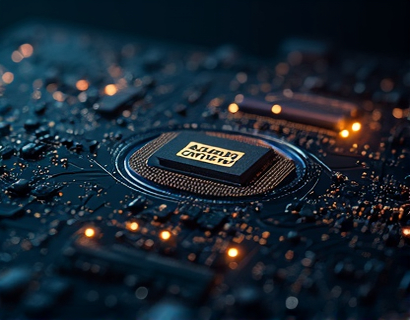Smart Contract Solutions for Pegged Token Creation and Seamless DeFi Exchange
In the rapidly evolving landscape of blockchain technology, smart contracts have emerged as a pivotal innovation, particularly in the creation of stable digital currencies pegged to UCASH and the facilitation of seamless decentralized finance (DeFi) exchanges. This article delves into the mechanisms and benefits of using smart contracts for pegged token creation, highlighting how these solutions enhance the stability, efficiency, and user experience in the DeFi ecosystem.
Understanding Pegged Tokens and Their Importance
Pegged tokens, also known as stablecoins, are digital currencies designed to maintain a stable value relative to a specific asset, such as UCASH. These tokens are crucial in the DeFi space as they provide a stable store of value and a medium of exchange, mitigating the volatility associated with traditional cryptocurrencies like Bitcoin and Ethereum. The stability of pegged tokens is essential for various DeFi applications, including lending, borrowing, and yield farming, where predictable value is necessary for effective financial planning and decision-making.
Role of Smart Contracts in Pegged Token Creation
Smart contracts play a vital role in the creation and management of pegged tokens. These self-executing contracts with the terms of the agreement directly written into code ensure transparency, security, and automation. When it comes to pegged tokens, smart contracts are programmed to maintain the token's value by automatically adjusting the supply or engaging in collateral management. This automated process minimizes human error and reduces the risk of manipulation, thereby enhancing trust in the system.
Mechanisms of Smart Contract-Based Pegged Tokens
Smart contracts for pegged tokens typically operate through several key mechanisms:
- Collateralization: To maintain the peg, tokens are often backed by sufficient collateral. For instance, for every UCASH-pegged token issued, a corresponding amount of UCASH or another stable asset is locked in a smart contract. This collateral ensures that the token's value remains stable.
- Automated Adjustments: Smart contracts can be programmed to adjust the supply of tokens in response to market conditions. If the token's price deviates from the peg, the smart contract can automatically buy or sell collateral to stabilize the price.
- Redemption and Issuance: Users can redeem their pegged tokens for the underlying asset or issue new tokens by providing the required collateral. These processes are automated through smart contracts, ensuring seamless and trustless transactions.
Benefits of Smart Contract Solutions for Pegged Tokens
The use of smart contracts in creating and managing pegged tokens offers numerous advantages:
Firstly, security is significantly enhanced. Smart contracts eliminate the need for intermediaries, reducing the risk of fraud and manipulation. The immutable nature of blockchain ensures that once a transaction is recorded, it cannot be altered, providing a high level of trust and reliability.
Secondly, efficiency is a major benefit. Automated processes reduce the time and cost associated with traditional financial transactions. Smart contracts execute trades and manage collateral in real-time, allowing for instantaneous and cost-effective operations.
Thirdly, user-friendliness is improved. Users can interact with the system through user-friendly interfaces, often accessible via web or mobile applications. The complexity of blockchain transactions is abstracted away, making DeFi more accessible to a broader audience.
Enhancing DeFi Ecosystem with Smart Contract Pegged Tokens
The integration of smart contract-based pegged tokens into the DeFi ecosystem transforms various financial services. Here are some key areas where these solutions make a significant impact:
Lending and Borrowing
Pegged tokens provide a stable asset for collateral in lending platforms. Users can borrow funds using their UCASH-pegged tokens as collateral, with the smart contract automatically managing the loan terms and collateral requirements. This enhances liquidity and provides users with more flexible financial options.
Yield Farming
Yield farming involves staking pegged tokens to earn rewards. Smart contracts ensure that the staked tokens are securely held and that rewards are distributed automatically. This process is transparent and trustless, encouraging more users to participate in yield farming activities.
Stable Liquidity Pools
Liquidity pools in DeFi exchanges can benefit from pegged tokens by offering stable liquidity. Smart contracts can manage the composition of these pools, ensuring that the liquidity remains stable and the trading pairs maintain their intended value ratios.
Seamless UCASH DeFi Exchange
A DeFi exchange that leverages smart contract solutions for pegged token creation and trading offers a seamless and efficient trading experience. Here’s how such an exchange operates:
Trade Pegged Tokens
Users can buy, sell, and trade UCASH-pegged tokens directly on the exchange. Smart contracts ensure that trades are executed at the agreed-upon price, with the transaction details recorded on the blockchain. This transparency and automation reduce the risk of price manipulation and ensure fair trading conditions.
Collateral Management
The exchange uses smart contracts to manage collateral for margin trading and other leveraged products. Users can deposit UCASH-pegged tokens as collateral to borrow additional UCASH or other assets. The smart contract monitors the collateral ratio and automatically triggers liquidation if the ratio falls below a predefined threshold, ensuring the exchange's solvency.
Cross-Chain Compatibility
Smart contract-based exchanges can facilitate cross-chain trading, allowing users to trade UCASH-pegged tokens with other cryptocurrencies across different blockchain networks. This interoperability enhances the liquidity and accessibility of the exchange, attracting a wider user base.
Challenges and Considerations
While smart contract solutions for pegged tokens and DeFi exchanges offer numerous benefits, there are also challenges and considerations to address:
Smart Contract Vulnerabilities
Smart contracts are only as secure as their code. Bugs or vulnerabilities in the code can lead to significant losses. Rigorous testing, auditing, and community review are essential to identify and mitigate potential risks.
Regulatory Compliance
The DeFi space is still navigating regulatory landscapes. Ensuring compliance with local and international regulations is crucial for the sustainability and legitimacy of smart contract-based financial solutions. This includes adhering to anti-money laundering (AML) and know-your-customer (KYC) requirements.
User Education
DeFi and smart contracts can be complex for new users. Providing educational resources and user-friendly interfaces is essential to democratize access and promote widespread adoption.
Future Prospects
The future of smart contract solutions for pegged token creation and DeFi exchanges looks promising. As blockchain technology matures and more developers focus on DeFi, we can expect:
Improved scalability solutions to handle higher transaction volumes without compromising speed or security. Enhanced interoperability between different blockchain platforms, enabling a more connected and efficient DeFi ecosystem. Advanced user interfaces that make DeFi more accessible to non-technical users, broadening the adoption base.
Moreover, the integration of machine learning and artificial intelligence into smart contracts could lead to more sophisticated and adaptive financial tools, further enhancing the capabilities of the DeFi space.
In conclusion, smart contract solutions for pegged token creation and seamless DeFi exchanges represent a significant advancement in the financial technology sector. These innovations offer secure, efficient, and user-friendly alternatives to traditional financial systems, setting a new standard for digital currency management and DeFi applications.










































